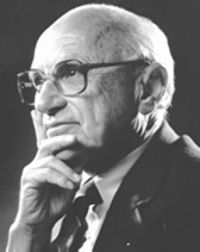
The last 50 years of the worlds economy has been a struggle between the forces of the ideas of John Maynard Keynes and Milton Friedman. Keynes comes from the more European styled more government intervention liberal perspective and Friedman form the American styled conservative deregulated free markets. These two forces worked well correcting each other, so much so that I have heard a prominent economics professor say that the Capitalism practiced today in
My conclusion, learning from the great economist and lectures of our time is that the markets must be free enough to be a messenger to us – and then the government steps in after that to repair and restores the causalities left behind by the market, only when there are no other options left.
I guess I would side more with the Friedman school of thought, not because I would like to see Laissez-faire economics oppress people again, but as Friedman said in his famous essay, “Is Capitalism Humane?”;
“Capitalism per se is not humane or inhumane; socialism is not humane or inhumane. But capitalism tends to give much freer rein to the more humane values of human beings. It tends to develop an atmosphere which is more favorable to the development on the one hand of a higher moral climate of responsibility and on the other greater achievements in every realm of human activity.”
Freer markets tend to develop the economy better, and a developed economy can produce more resources to help others. Now granted that the money may be hoarded by the elite, this is why the governance and policies of a nation are also so crucial, and in my Christian interest, I want to see the poor and marginalized helped with both their dignity in their self effort intact and when they cant put in any effort – then I want to see them helped without killing the goose that lays our golden eggs.
I post this mainly as a tribute to Milton Friedman, who passed away last Thursday, 16 November 2006. A great economist in the tradition of Adam Smith, he was known as the great champion of economic freedom in the 20th Century.
The short summary of Friedman’s life and work can be found on AdamSmith.org;
Friedman is best known for his monetarist policies – insisting that inflation is highly destructive and that only monetary policy can control it – but that monetary policy is a heavyweight instrument and cannot be used for short-term economic management. But he is also distinguished for pioneering work on other subjects such as the unintended effects of professional licensing and prise regulation, tax policy, and the theory of the consumption function.
To find out more, get his book Capitalism and Freedom: Fortieth Anniversary Edition
or to learn about Friedman and some other important economist in history check out this resource:
Legacies of Great Economists (Course No. 528)
(10 lectures in MP3, 45 minutes/lecture for USD 15.95)
Taught by Professor Timothy Taylor for The Teaching Company















3 comments:
lets be productive christians in an age of guilt manipulators
Am more of a fan of John Kenneth Galbraith, not exactly one of Friedman's friendlier counter-parts. Friedman believed in the workability of the market; Galbraith felt ppl like Friedman didn't see enough of the 'power' issues (esp those wielded by huge corporations).
And the debate goes on.
I think both Friedman and Smith saw the power issues clearly - Smith even said corporations start plotting the raising of prices against the consumer the minute they get together. : ) I think where open market people differ is in the solution – they really believe that the forces of the market carry an amazing ability to discipline and government only steps in and punishes when absolutely necessary.
Post a Comment